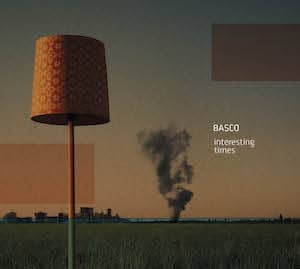 Basco – Interesting Times
Basco – Interesting Times
GO Danish Folk Music – 2017
Basco started life back in 2003 on the back of Hal Parfitt Murray, raised in Scotland and Australia with a strong background in the Celtic fiddle tradition, to have an outlet for his prolific tune compositions. Both in their recorded work and live they have a certain something – a quirky way of amalgamating a range of European and North American traditional and sometimes classical and jazz influences that results in an intriguing and very rewarding listening experience. Their new album Interesting Times is no exception.
The boisterous opening tune, The Way Of All Flesh, is more typical of their previous 2013 album, The Remarkable Return Of Old Man Basco, than most of what follows. Jagged fiddle with an understated accordion accompaniment fills the track with a sense of drama – which for me evokes images of train journeys or a chase. Watch their new video for it below:
In their song selections, Basco look firmly in the direction of the British and Irish traditions. On Interesting Times the ballad Patrick Spens tells a story which, appropriately for Basco, involves a Scottish Royal and a Scandinavian bride. Basco’s original arrangement has echoes of more familiar versions, especially calling to mind elements of Kris Drever’s take on his majestic Blackwater. It can, of course, be very challenging for a listener to fully get inside a newly written tune for an old song, as the more familiar ones leave an indelible imprint, leading us to associate the words with the tune we know best. In this case, the tune, which has a Jim Moray style sensibility to it (equally so the vocal), at first feels right for the song. For me, the changing pace used to reflect the brewing storm ends up getting in the way of being able to follow the song’s narrative but full marks for effort though.
You can listen to Basco’s version of Patrick Spens on the Folk Radio UK Folk Show EP. 6 here.
Seven other tracks on Interesting Times are also original tunes, with evident traces of English, Celtic and French-Canadian traditions, but still recognisably Scandinavian – the band includes two Danes and a Swede. There is an excellent mix from the upbeat – like the opener and the similarly paced The Snitch, where a trombone takes the place of the accordion alongside the fiddles – to Tesla’s Waltz which meanders around nicely and is coupled with A Flat in Berlin, evoking a fast-paced city.
The slower tunes feel like the cornerstone of the album. The Friendly Neighbour could almost be a tune from the great Spanish band Radio Tarifa. The reflectiveness of Roses In The Vase and sad regretfulness of The Diplomat’s Lament are tunes of such quality that it would be no surprise to find them being picked up by other players. The pairing of fiddle and viola brings to mind no less than Kronos Quartet on some of the slower numbers. The variety of instruments the four band members use – fiddles, cittern, viola, accordion and trombone – are employed in varied and consistently interesting combinations, and the absence of guests which was a feature of previous albums contributes to a greater consistency of sound.
The other song on the album, The Three Mothers, is a lovely version of the Irish anti-war song Mrs McGrath. Set during the Peninsular War of the early 19th century, the song tells of a mother lamenting her son having had both legs blown away by a cannonball after seven years fighting for the British Army against Napoleon. The song was said by Colm O’Lochlainn (collector of Irish ballads and traditional Irish Uilleann piper), who learned it while serving in the forces, to be ‘known by every true citizen of Dublin’. He went on to say on the lead-up to the 1916 Easter Rising it was the most popular marching song of the Irish Volunteers. Bruce Springsteen re-wrote the song for his ‘Seeger Sessions’ in 2006, slowing it down from the traditional jaunty version to be more in keeping with the solemnity of the subject matter. Likewise, the slower pace of the Basco arrangement provides a very effective setting for the song as a haunting lament, with the usual chorus supplanted by repetition of the final line of each verse which serves to heighten the pathos of the tale.
Basco firmly put Interesting Times in the context of the state of the world with a sleeve note that talks about a ‘crossroad’ facing ‘our generation’ which, if we don’t avoid it, will lead to ‘the full depths of human suffering’. This choice provides the context for a coherent and exceptionally evocative work. They extend this invitation:
‘Take a moment. Sit yourself down in a comfortable chair, and pour yourself a goodly glass of whatever heals you. Listen, ponder and sip your drink, and we’ll see you all out there tomorrow ready to sniff the air, feel the grass, and see which road seems better.’
You should accept the invitation.
Basco are:
Ale Carr – Cittern
Andreas Tophøj – violin, viola
Hal Parfitt Murray – violin, mandolin
Anders Ringgaard – accordion, trombone
Basco play Trelawnyd Memorial Hall, Wales with Habadekuk (Denmark) and Ímar (Scotland) on Saturday, September 30, 2017, @ 6:00 pm – www.therecordjournal.co.uk
